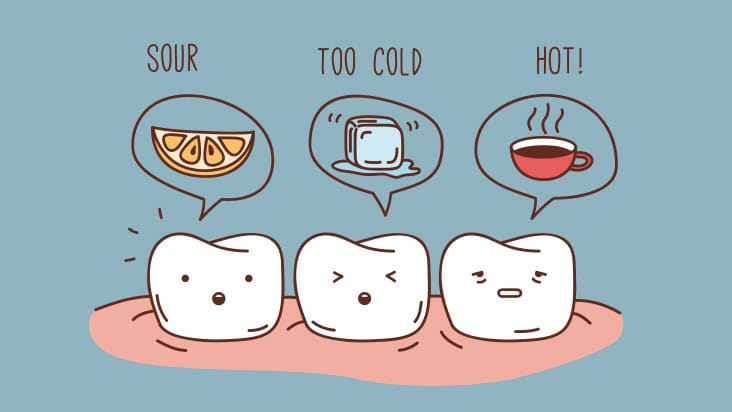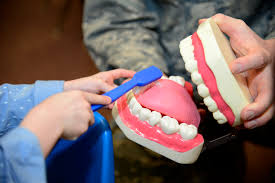Ask the Dentist: Sensitive Teeth - Why does it happen? How can I fix it?
You or a family member may have just finished dinner and gone to grab an ice block from the freezer. But as you bite into the ice block, you suddenly you feel a sensitive jolt or pain inside the middle of your tooth. What just happened? In this article, Dr Ken wants to help patients understand the follow questions: What are sensitive teeth? Why do teeth get sensitive? What causes teeth to be sensitive? What can I do to manage it? How can I prevent it?
What are sensitive teeth?
Tooth sensitivity is a common name for dentine hypersensitivity or root sensitivity. You may experience it when you feel sensitivity or pain in your teeth from hot, cold, sweet, acidic or sour foods and drinks. It can be as mild as a tingle or as severe as a sharp pain shooting through the inside of your tooth where the nerve is. Sometimes the sensitivity may occur from breathing in cold air or having a toothbrush touching the teeth
Symptoms and triggers of Sensitive Teeth
cold foods and beverages
hot foods and drinks
cold air
sweet foods and beverages
acidic foods and beverages
cold water, especially during routine dental cleanings
brushing or flossing teeth
mouth rinses
The symptoms may even come and go over time for no obvious reason. They may range from mild to intense.
Is it common to have sensitive teeth?
Tooth sensitivity is very common and it has been estimated that approximately half the population experiences tooth sensitivity. Tooth sensitivity can come and go over time.
Why do teeth get sensitive?
Before we move on to explaining the causes for sensitive teeth, we first need to understand that there are different parts to the structure of a tooth
Enamel - the hard layer that covers the top part of a tooth. The enamel is really hard and dense and protects the dentine and pulp from the external environment.
Dentine - this is the layer underneath the enamel and the dentine makes up the majority of the tooth structure.
Pulp - this is the inside of the tooth that contains the nerve and blood supply
Dentine Hypersensitivity
Microscopically, the structure of the dentine is porous meaning that it has microscopic holes in it (dentine tubules) and some of those little holes connect to the inside of the tooth where the nerve is placed. So in the situation where the dentine is exposed (i.e when dentine isn’t covered by the enamel, gums or the bone) you may feel sensitivity from hot and cold foods and drinks, sweet or sour foods and drinks, cold air, or even brushing on the exposed dentine. This is called Dentine Hypersensitivity.
However it is important to note that not all people who have exposed dentine on their teeth will experience sensitivity, and you don’t need a lot of exposed dentine to experience really sensitive teeth.
Dentine Hypersensitivity - Exposed Dentine
What causes teeth to be sensitive?
This is the section we want you all to read and understand well because it can prevent further sensitivity on your teeth. Sensitive teeth can be caused by the following dental problems:
Problem: Worn tooth enamel from using a hard toothbrush or using too much force while brushing the teeth.
Solution: Always use a soft bristled toothbrush and always treat brushing along the gums like you’re massaging them. You’re not scrubbing the BBQ or a pot when you’re brushing the gum line. Be gentle. Dr Ken recommends the Systema Toothbrush and you can read his blog article (Ask the Dentist: What toothbrush do dentists recommend? to find out why). For people who find it hard to control the force of their brushing, consider purchasing an electric toothbrush with a pressure sensor that warns you if you’re pressing too hard.
Problem: Tooth erosion due to highly acidic foods and beverages or reflux. If its food related, this may be from foods like lemons, limes, tomatoes, vinegars or carbonated soft drinks. Tooth erosion can also be caused by acid reflux and you may need to see a medical doctor to have it investigated and managed.
Solution: The answer isn’t to cut out acidic foods and beverages completely. You can start by making sure you incorporate drinking water regularly when you have acidic foods and drinks and you may need to cut down on the frequency and amount as well if you’re constantly grazing on them or having them in high quantities
Problem: Tooth decay, or worn down leaky fillings and broken teeth that expose the dentine of your tooth.
Solution: The tooth may require fillings being placed or replaced to stop the dentine exposure
Problem: Gum recession that leaves your root surface exposed. This may be caused by continued plaque/calculus build up which over time erodes your gum/bone down from the tooth. Or it can be caused by brushing tooth hard
Solution: Brush carefully along the gums and floss in between the teeth along the gumline to remove plaque and in turn, minimise calculus (tartar) build up. Always use a soft toothbrush and be gentle on the gums
Problem: Grinding your teeth at night.
Solution: You may need to get a customised occlusal splint (night guard) to protect your teeth. But in serious cases, you may need to see a sleep specialist or ENT (ear nose throat) specialist to investigate into the causes of your grinding
Problem: Post dental treatment sensitivity – common, but temporary, especially with procedures such as crowns, fillings and tooth bleaching.
Solution: Assess how it goes and generally it can go away after 2 weeks. If it is still sensitive after 2 weeks, you may need to return to your dentist and have the filling, teeth, crown assessed.
What can I do to manage sensitive teeth?
In terms of management of sensitive teeth, the following may be recommended
Desensitising Toothpaste: Ask your dentist for samples of Colgate Pro Relief or Sensodyne. You can buy them directly at the supermarkets or pharmacy. These toothpastes have special properties which aim to cover the exposed dentine tubules to help make it less sensitive for your teeth. Choose toothpaste that’s labelled as being specifically made for sensitive teeth. These toothpastes won’t have any irritating ingredients, and may have desensitising ingredients that help block the discomfort from travelling to the nerve of the tooth. When it comes to mouthwash, choose an alcohol-free mouth rinse, as it will be less irritating to sensitive teeth. It typically takes several applications for these remedies to work. You should see an improvement within a week.
Soft Toothbrushes: Using softer toothbrushes and brushing more gently can also help. Soft toothbrushes will be labelled as such. Dr Ken recommends the Systema Toothbrush and you can read his blog article (Ask the Dentist: What toothbrush do dentists recommend? to find out why).
Specialised Toothpaste: Tooth Mousse is formulated to help to protect teeth and some find patients find it really helpful in managing sensitivity
Fillings: If the sensitivity is because of worn down enamel, we may recommend placing small fillings on the exposed areas to cover the exposed dentine
Surgery: In more severe cases where you are also unhappy with the appearance of receding gums, you may consider gum grafting with a gum specialist (periodontist).







